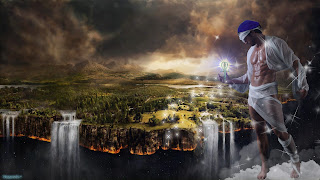Happy Labor's Day
Ptah is the chief god of the ancient city of Memphis. He was a creator god who brought all things to being by thinking of them with his mind and saying their names with his tongue. He was unique amongst Egyptian creation gods in that his methods were intellectual, rather than physical. According to the priests of Memphis, everything is the work of Ptah's heart and tongue: gods are born, towns are founded, and order is maintained. Ptah was also the patron God of Craftsmen, the later is probably correct. He was a patron of the arts, protector of skilled stonecutters, sculptors, blacksmiths, architects, boat builders, artists and craftsmen. His high priest was given the title wr khrp hmw, 'Great Leader of Craftsmen', and his priests were probably linked to the different crafts. As a craftsman, Ptah was said to have carved the divine bodies of the royalty. Ptah invented masonry and that it was he who crafted the boats that the dead used to travel to the Duat.
Hephaestus is the Blacksmith of the Heaven and God of Metalwork, Fire and Jewelry. Hephaestus (he who shines by day), the Smith-god, was so weak at birth that his disgusted father, Zeus, dropped him from the height of Olympus to rid himself of the embarrassment his pitiful appearance caused him. He survived this misadventure, however, without bodily damage after he fell into the sea where Thetis and Eurynome were on hand to rescue him.
Vulcan is the Roman God of Fire including the fire of volcanoes, also god of metalworking and the forge. Vulcan is often depicted with a blacksmith's hammer. Tossed from the heavens as a child, he grew up as a strong-willed outsider and free thinker, indifferent to the whims of the gods. This independence fueled his approach as a smith and craftsman, helping him forge works that no one else thought were possible. The Vulcanalia was the annual festival held August 23 in his honor. His Greek counterpart is Hephaestus, the god of fire and smith work.
Lugh is the great Celtic God of the Sun, and was greatly skilled at many things. His name translates as "Shining One". As a Divine Jack-of-all-trades, he was patron God to all manner of craftspeople; musicians, magicians, healers, and warriors. In looks he is youthful, fair and handsome. Lugh is a master builder, harper, poet, warrior, sorcerer, metalworker, cupbearer and physician. It's hard to envision anything at which Lugh does not excel. He was venerated throughout the ancient Celtic world.
Brigid is a Celtic triple goddess ruling healing, poetry, and smithcraft. She is one of the great mothers of the Celts. (The Celts had many mother goddesses, including Danu and Morrigan.) Variant forms of her name include Brid, Bride, Brighid, Brigit, pronounced either as "breed" or with a softened "g" sound. She is also known as Brigantia, Briginda, and Brigdu. Her Welsh name in Ffraid. Her modern name is Brigit or Bridget as derived from her Christianization into St. Bridget. Her name, Brighid, thought to be derived from Bhrati in Sanskrit, is originally an epithet meaning "exalted one". The Romans equated Brighid with Minerva and she can be similarly equated with the Greek Athena.







Comments
Post a Comment